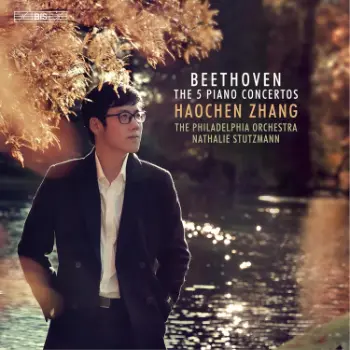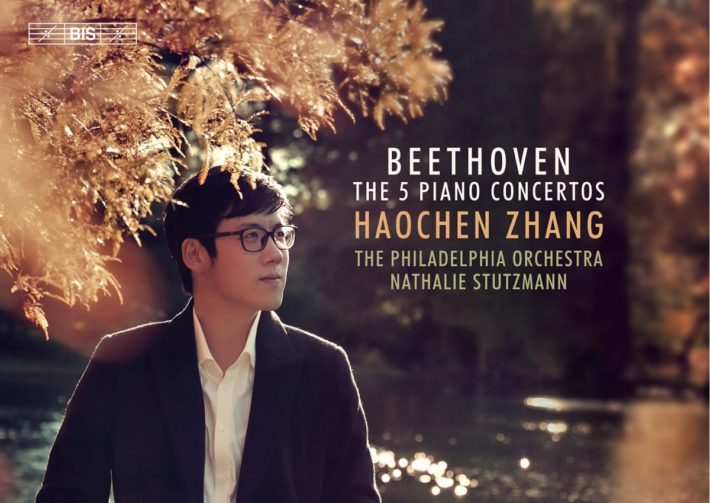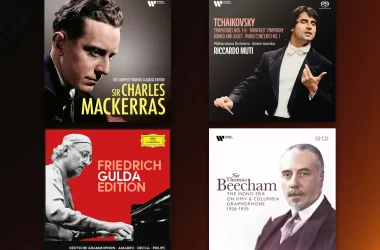Even though he won the gold medal at the Thirteenth Van Cliburn International Piano Competition in 2009, Haochen Zhang official debut solo album, featuring an eclectic collection of works by Schumann, Liszt, Brahms, and Janacek, only appeared in 2017. His first concerto album followed two years later, with performances of Prokofiev’s Second Piano Concerto and Tchaikovsky’s First Piano Concerto with the Lahti Symphony Orchestra under Dima Slobodeniouk (reviewed here). This new release enters an already overcrowded field, in which BIS already has two excellent cycles featuring Ronald Brautigam, the first played on a modern Steinway accompanied by the Norrkoping Symphony Orchestra and Andrew Parrott, the other played on the pianoforte accompanied Die Kölner Akademie and Michael Alexander Willens. Adding a third cycle to their catalogue is surely an indication of how highly the BIS label values its partnership with Zhang.

Zhang’s technique is, as one would expect, dazzling. Runs are dispatched with enviable evenness and crystalline clarity; one searches in vain for smudged notes or misjudged rhythms. Beethoven’s writing is always carefully voiced to ensure the melodic line is clearly heard, and Zhang gets a lean, lissome tone from his Steinway, perfectly suited to the fast movements of first two concertos. There is also an impressive chamber music like intimacy between piano and orchestra that shows Zhang understands this aspect of Beethoven’s writing.
The Philadelphia Orchestra’s playing is also uniformly excellent. Listen to how beautifully Stutzmann shapes the opening exposition of the first concerto, distilling an atmosphere of excited expectation. Zhang’s perfectly realizes Beethoven’s unexpectedly genial response, though the ease with which he tosses off the following deluge of rapid passagework is mightily impressive. The entire movement has a lightness that sounds fresh and newly minted. The slow movement has more introverted, played with a beguiling lyricism by Zheng and the orchestra, while the final movement returns us to the playful high spirits of the first. A similar joy de vivre is found in the second concerto, and both performances are definite highlights of the set.
The later concertos are not quite as successful. The liner notes argue that the third concerto “marks a change of course and a profound stylistic change” that prioritizes the emotional element of the music. Yet here the third’s opening exposition seems to inhabit the same decorous world of the first two concertos. In performances led by Gardiner, Parrott, and even Rattle (in Alfred Brendel’s cycle from Vienna) there is more obvious anxious, driven quality. Zhang too, is focused on transparency and rounded tone at the expense of more troubled, darkly colored moods. The slow movement is different, the piano’s opening, exquisitely voiced and richly colored, invoking a stark and forlorn atmosphere, heightened by the orchestras richly detailed response. Special praise to the first bassoon, whose playing is particularly touching. Sadly, the final movement’s manic intensity is only fitfully realized.
Related Posts
- Review: “Contralto” – Nathalie Stutzmann, Orfeo 55
- Review: Beethoven – Complete Piano Concertos – Zimerman, LSO, Rattle
- Review: Beethoven – Complete Piano Concertos – Bavouzet, Swedish Chamber Orchestra
The performance of the fourth is more successful, perhaps because the music is cheerier, less angst-ridden than the third. The slow movement is again particularly poignant, Zhang and the orchestra offering playing of elegance and sophistication. Despite the orchestra’s historically informed style, I hoped the Emperor would have greater weight and power than period instruments, but the Levin/Gardiner and Aimard/Harnoncourt teams both generate a more imposing and magisterial opening. Both Gardiner and Parrott set a quicker pace, asking for sharper orchestral attacks, the strings digging deeply into the opening theme, which then inspires a similar level of intensity from Levin and Brautigam. But Zhang seems to want to downplay the passion of this music, seeking more emotional restraint in music that seems to demand the opposite.
The slow movement is wonderful, the Philadelphia strings supple and velvety, everyone coming together to establish a heartrending beauty. In the final movement, everything in the score is scrupulously observed, and there is a lightness to articulation and weight of the sound that makes suggests the spirit of dance .
BIS’s engineered SACD sound is fabulous. Having attended numerous concerts in Philadelphia’s Verizon Hall, these recordings capture the orchestra’s sound and presence more faithfully than DG’s recent recordings. Balance between piano and orchestra is expertly managed. Anyone hoping for a steady stream of the luxurious Philadelphia string sound may be disappointed. Stutzmann and the orchestra embrace historically informed performance practice, so the strings use minimal vibrato, clear articulation, supple colors, and leaner tone. Winds have a clear presence in orchestral tuttis with their many solos clearly heard, and timpani are played with hard sticks.
Jean-Pascal Vachon’s liner notes are informative and engaging. Collectors purchasing the physical CDs may be frustrated by the short timing of the third CD. Other sets often include the Rondo for Piano & Orchestra in B-flat; Brautigam’s Norrkoping set also includes the composer’s arrangement of his Violin Concerto for piano and orchestra, as well as Brautigam’s edition of Beethoven’s early E-flat concerto, written in his early teens. Fans of Haochen Zhang will need no special pleading to acquire this new set, but, despite the excellent playing and recording, these performances do not match the depth and brilliance of Brautigam, Brendel or Aimard.
Beethoven – The Five Piano Concertos
Haochen Zhang – Piano
Philadelphia Orchestra
Nathalie Stutzmann – Conductor
BIS, CD BIS-2581 SACD




















